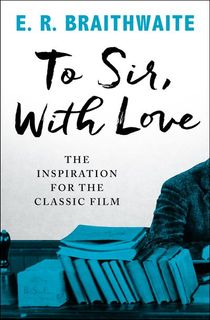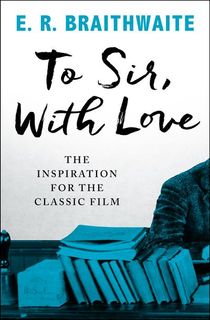As a Black man in the 1950s, a time during which racism was rampant, the odds were against E.R. Braithwaite. Few people expected him to succeed as an engineer, much less as a high school teacher in London's East End. His all-white students were disrespectful at best, and delinquent at worst—an impossible gaggle of undereducated, hormonal teenagers who had no respect for his authority. And yet, despite these bumpy beginnings, Braithwaite was able to turn things around by using a simple but unusual tactic: He would treat his students as adults.
Braithwaite wrote of his experiences in his autobiographical novel, To Sir, With Love, in 1959. Eight years later, it became the classic film of the same name, with Sidney Poitier stepping into Braithwaite's shoes. Poitier, who passed on January 6, 2022, was the ideal actor to bring Braithwaite's novel to the big screen. Both men strove to break barriers, challenge perceptions about Black people, and make the world a fairer—and better—place.
Like its source material, the movie is a stirring tribute to the powerful relationships between teachers and students, adults and children. It also serves as an example of how, by recognizing the inherent and equal value of every individual, we can transcend racial and class barriers—whether that's in the classroom, or outside of it.
In the excerpt of To Sir, With Love below, Braithwaite has just arrived at Greenslade Secondary School, located in a rough part of the city. He's astonished at the students he'll be teaching—and tries to holds his temper when he receives a less than professional welcome from the staff, too.
Read on for an excerpt of To Sir, With Love by E.R. Braithwaite, and then download the book.
FROM THE HEADMASTER’S OFFICE A short flight of stairs led down to a narrow corridor between the auditorium on one side and some classrooms on the other. I paused for a moment outside the first of these classrooms, not sure where to begin, when the door was pushed violently outwards and a tall, redheaded girl rushed out into the corridor closely pursued by two others. In such a narrow space I was quite unable to dodge her wild progress, so I quickly grabbed her by the arms to avoid being bowled over and to steady her. Quickly recovering herself she shook loose, smiled impudently in my face, and with a quick “Sorry” raced down the corridor and out of sight. Her companions pulled up hastily, stopped a moment to look at me, then quickly re-entered the classroom, letting the door bang loudly shut behind them.
I was staggered by this unexpected encounter and remained where I was for a moment, unsure of what to do next. Then, deciding to take a closer look at what went on in that room, I knocked on the door, opened it and walked in. There was a general hubbub and for a little while no one seemed aware of my entry, and then, very gradually, one by one the occupants turned to stare at me.
There was no sign of anyone who looked like a teacher. About forty boys and girls were in the room. Perhaps it would be more accurate to call them young men and women, for there was about most of them a degree of adulthood, not only in terms of obvious physical development, but also in the way their clothes were worn to emphasize that development whenever possible. They stood around the room in casual postures; some were clustered around a large open empty fireplace in one corner; a few were sitting on desks or chairs in careless unscholarly attitudes. They nearly all wore a kind of unofficial uniform. Among the girls, proud of bust and uplift brassiere, this took the form of too-tight sweaters and too-long clinging skirts and flat-heeled shoes. A wide variety of hairstyles paid tribute to their particular screen favorite. It was all a bit soiled and untidy, as if too little attention were paid to washing either themselves or their flashy finery. The boys wore blue jeans and T-shirts or open-necked plaid shirts.

A large, round-faced, freckled girl left the group by the fireplace and approached me.
“If you’re looking for Mr. Hackman, he’s not here, he’s in the staffroom,” she announced. “He said when we are ready to behave one of us can go and call him.”
The various groups began to disintegrate and reform on either side of this self-elected spokesman, and I was subjected to their bold, unabashed scrutiny. God, I thought, what a crowd! Suddenly they were talking all at once, as if a penny had finally dropped somewhere; the questions came thick and fast.
“Are you the new teacher?”
“Are you taking Old Hack’s place?”
“Is old Hackman really leaving?”
Taking my cue from the fat girl’s first remark I said: “I think I’ll look in at the staffroom,” and slipped quickly through the door. I felt shocked by the encounter. My vision of teaching in a school was one of straight rows of desks, and neat, well-mannered, obedient children. The room I had just left seemed like a menagerie. What kind of fellow could this Hackman be who would stand for that sort of behavior? Was it the accepted thing here? Would I have to accept it too?
With these disturbing thoughts I walked down the corridor towards some double doors which I guessed would lead in the general direction of the staffroom; as I approached them they were opened by the red-head, who swished imperiously past on her way back to her classroom. I turned to look at the retreating figure topped by long auburn hair caught up in a pony-tail which jerked in time to her vigorous, hip-swaying stride. Mr. Florian’s cryptic remarks were beginning to make a lot of sense; things were certainly different around here.
The staffroom lay up a short flight of stairs beyond the end of the corridor; the door was open. Reclining in an easy chair, fingers interlocked behind his head, was a large, hairy, cadaverous, young man, in baggy gray flannel slacks and a well-worn hacking jacket with leather patches at the elbows and wrists. A maroon shirt and yellow large-knotted tie did nothing to dispel the air of general untidiness which enveloped him. As I entered he looked up at me and remarked:
“Ah another lamb to the slaughter—or shall we say black sheep?”
In appreciation of his own witticism he smiled broadly, exposing some large, uneven, yellow teeth.

Prior to becoming a teacher, E.R. Braithwaite was a Royal Air Force pilot and studied physics.
Photo Credit: AlchetronI have always been subject to quick explosive anger, but for years I have been making a determined attempt to exercise close control of my temper. So now I watched this fellow, ready, willing and, I hoped, able to take a joke about myself.
“My name’s Braithwaite. I’m from the Divisional Office.”
“So you’re the new teacher,” he replied. “Hope you have better luck with the bastards than Hackman did.”
“I thought you were Hackman, because some of the children said he was waiting here until one of them called him.”
“He was, for about ten seconds, then he girded up his loins and departed.” He grinned. “I expect that by now he is pouring out his woes to the Divisional Officer.”
“What happens to his class now?” I enquired.
At this he guffawed loudly. “Without being too prophetic, I’d say you’re for it.”
While I digested this little bit of frightening information he got up and left the room.
Want to keep reading? Download To Sir, With Love by E.R. Braithwaite today.
This post is sponsored by Open Road Media. Thank you for supporting our partners, who make it possible for Early Bird Books to continue publishing the book stories you love.
Featured still from "To Sir, With Love" (1967), via Columbia Pictures; photo of E.R. Braithwaite: Alchetron


